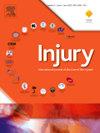Cefazolin vs. alternative beta-lactams for prophylaxis in lower extremity fracture surgery: A target trial emulation
IF 2.2
3区 医学
Q3 CRITICAL CARE MEDICINE
Injury-International Journal of the Care of the Injured
Pub Date : 2025-02-15
DOI:10.1016/j.injury.2025.112215
引用次数: 0
Abstract
Background
Cefazolin is the primary antibiotic for surgical prophylaxis in orthopedic procedures. The cessation of cefazolin supply in approximately 60 % of Japanese hospitals from 2019 to 2020 provided an opportunity to evaluate the effectiveness of alternative beta-lactams for preventing surgical site infection (SSI). Given the global potential for antibiotics shortages, confirming the effectiveness of alternative beta-lactams is critical.
Purpose
This study aims to evaluate the differences in risk of reoperation for SSI between cefazolin and alternative beta-lactams in patients undergoing lower extremity fracture surgeries.
Methods
We emulated a target trial to compare the effectiveness of cefazolin with alternative beta-lactams—specifically broad-spectrum penicillins and cephalosporins—in preventing SSI using a Japanese hospital administrative database provided by JMDC Inc. We included patients undergoing initial open reduction and internal fixation for closed lower extremity fractures between March 1, 2019, and February 29, 2020. The outcome was reoperation for SSI within 30 days after surgery. Risks were estimated using pooled logistic regression with adjustment for confounders via inverse probability weighting. Sensitivity analyses extended the follow-up period to 90 and 365 days.
Results
Of the 16,602 patients analyzed, 35 patients (0.30 %) in the cefazolin group (11,538 patients) and 16 patients (0.32 %) in the alternative beta-lactam group (5,064 patients) underwent reoperation for SSI within 30 days. The estimated 30-day risk was 0.31 % in the cefazolin group and 0.37 % in the alternative beta-lactam group, resulting in a risk difference of −0.06 % (95 % confidence interval [CI], −0.33 to 0.14) and a risk ratio of 0.82 (95 % CI, 0.50 to 1.52). In sensitivity analyses, the estimated 90-day risk was 0.67 % in the cefazolin group and 0.57 % in the alternative beta-lactam group, with a risk difference of 0.10 % (95 % CI, −0.15 to 0.32) and a risk ratio of 1.19 (95 % CI, 0.80 to 1.62). The 365-day risk was 1.02 % and 0.90 %, respectively, with a risk difference of 0.12 % (95 % CI, −0.29 to 0.39) and a risk ratio of 1.13 (95 % CI, 0.78 to 1.51).
Conclusions
In surgeries for lower extremity fractures, substituting cefazolin with alternative beta-lactams did not result in substantial differences in the risk of reoperation for SSI.
头孢唑林与替代β -内酰胺预防下肢骨折手术:目标试验模拟
背景头孢唑啉是骨科手术预防的主要抗生素。从 2019 年到 2020 年,约 60% 的日本医院将停止供应头孢唑啉,这为我们提供了一个评估替代β-内酰胺类药物预防手术部位感染(SSI)有效性的机会。目的 本研究旨在评估头孢唑啉和替代β-内酰胺类药物在下肢骨折手术患者中因 SSI 而再次手术的风险差异。方法 我们利用 JMDC 公司提供的日本医院管理数据库,模仿目标试验,比较头孢唑啉和替代β-内酰胺类药物(特别是广谱青霉素类和头孢菌素类)在预防 SSI 方面的有效性。我们纳入了2019年3月1日至2020年2月29日期间接受初次开放复位和内固定术的闭合性下肢骨折患者。结果为术后 30 天内因 SSI 再次手术。采用集合逻辑回归估算风险,并通过反概率加权调整混杂因素。结果 在分析的16602名患者中,头孢唑啉组(11538名患者)有35名患者(0.30%)和替代β-内酰胺组(5064名患者)有16名患者(0.32%)在30天内因SSI再次手术。估计头孢唑啉组的 30 天风险为 0.31%,替代β-内酰胺组为 0.37%,风险差异为-0.06%(95% 置信区间 [CI],-0.33 至 0.14),风险比为 0.82(95% 置信区间 [CI],0.50 至 1.52)。在敏感性分析中,估计头孢唑啉组的90天风险为0.67%,替代β-内酰胺组为0.57%,风险差异为0.10%(95% CI,-0.15至0.32),风险比为1.19(95% CI,0.80至1.62)。365天的风险分别为1.02%和0.90%,风险差异为0.12%(95% CI,-0.29至0.39),风险比为1.13(95% CI,0.78至1.51)。
本文章由计算机程序翻译,如有差异,请以英文原文为准。
求助全文
约1分钟内获得全文
求助全文
来源期刊
CiteScore
4.00
自引率
8.00%
发文量
699
审稿时长
96 days
期刊介绍:
Injury was founded in 1969 and is an international journal dealing with all aspects of trauma care and accident surgery. Our primary aim is to facilitate the exchange of ideas, techniques and information among all members of the trauma team.

 求助内容:
求助内容: 应助结果提醒方式:
应助结果提醒方式:


